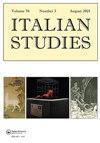但丁的主情节与喜剧中的另类叙事模式
IF 0.2
3区 文学
0 HUMANITIES, MULTIDISCIPLINARY
引用次数: 0
摘要
在他与读者的关系中,但丁很容易被认为是最专制的作家。在他的全部作品中,无论是在《新生》和《康维维奥》中使用的自我注释,还是在《喜剧》中高度确定的线性叙事中,通过对读者的直接禁令,他都表现出了对如何阅读和解释他的作品的强烈关注。然而,学者们已经开始识别出一个不同的但丁,他的作品显示出脆弱的迹象,并对更广泛的解释可能性持开放态度。这种批判倾向的一个关键例子出现在最近出版的《牛津但丁手册》(Oxford Handbook of Dante)中,该书由Manuele Gragnolati、Elena Lombardi和Francesca Southerden编辑。正如这本书的编辑在前言中所写的那样:“《手册》有兴趣让另一个人物出现在更坚实、更一致(有人可能会说过于一致)的但丁身边:一个(被塑造)对诠释开放的但丁,从(他的作品)的完成和整体性的束缚中解脱出来。”因此,《手册》并不想系统化但丁,也不想重复《新生》的姿态,强加一个统一的叙事,固定时间的空隙。相反,《手册》邀请开放和多元化的解释,类似于在散文框架之外恢复时间的对话特征的过程”(第xxxii页)。Nicolò Crisafi的第一部专著,基于他的博士项目,出现在牛津大学的知识环境中,培养了《手册》,它分享了该合集的兴趣,提出了一个更开放和多元化的但丁。它的重点是喜剧中不可避免的“主情节”:“诗人在其人生道路的不同阶段所经历的进步轨迹,在回顾中理解了他的自传、他的写作生涯和他的主人公在喜剧中的进步”(第1页)。主情节代表了诗歌的主导、“目的论”叙事模式,由此“诗人能够将早期作品或诗歌的早期部分置于一个终点的修正主义者的注视之下”(第1页)。然而,与其从表面上看待这个主情节,Crisafi试图解构它的运作方式,将人们的注意力吸引到与它的主导地位相关的一些批判性和解释学问题上,并揭示了一些另类的、“非线性”的叙事形式,这些形式也在诗歌中起作用。内容丰富的引言章节首先展示了但丁的主要情节如何影响和塑造了现代批评文学的语言。Crisafi研究了围绕喜剧的批评性话语中的一些关键词(例如“转换”,“palinode”,“合成”,本文章由计算机程序翻译,如有差异,请以英文原文为准。
Dante’s Masterplot and the Alternative Narrative Models in the Commedia
In his relationship to his readership, Dante can easily be regarded as the most autocratic of writers. Throughout his oeuvre, whether in the use of self-exegesis in the Vita nova and Convivio or in the highly determined linear narrative of the Commedia, punctuated by direct injunctions to its reader, he demonstrates an intense preoccupation with controlling how his work is to be read and interpreted. Scholars have, nevertheless, begun to identify a different Dante, one whose work shows signs of vulnerability and is open to a wider range of interpretative possibilities. A key example of this critical tendency came in the recent Oxford Handbook of Dante, edited by Manuele Gragnolati, Elena Lombardi, and Francesca Southerden. As the editors of the volume write in their introduction: ‘the Handbook is interested in letting another figure emerge alongside that more solid and consistent (one might say overly consistent) Dante: a Dante who is (made) open to interpretation, unbound from the shackles of completion and wholeness haunting [his work]. As such, the Handbook does not want to systematize Dante, nor repeat the gesture of the Vita nova of imposing a unitary narrative and fixing the porosity of the rime. Instead, the Handbook invites openness and the plurality of interpretation, similar to the process of recovering the dialogic character of the rime outside of the prose frame’ (p. xxxii). Nicolò Crisafi’s first monograph, based on his doctoral project, emerges from the intellectual environment at the University of Oxford that fostered the Handbook and it shares that collection’s interest in proposing a more open and plural Dante. Its focus is on the ineluctable ‘masterplot’ of the Commedia: ‘the trajectory of progress through which the poet, at various stages of his path, understands in retrospect the most significant events of his autobiography, his writing career, and his protagonist’s progress in the Commedia’ (p. 1). The masterplot represents poem’s dominant, ‘teleological’ narrative mode, whereby ‘the poet is able to subjugate earlier works or earlier parts of the poem to the revisionist gaze of an endpoint’ (p. 1). Rather than taking this masterplot at face value, however, Crisafi attempts to deconstruct its workings, draw attention to some of the critical and hermeneutical problems associated with its dominance, and shed light upon some of the alternative, ‘non-linear’ forms of narrative that are also at work within the poem. The substantial introductory chapter first shows how Dante’s masterplot has impacted upon and shaped the language of modern critical literature. Crisafi examines a selection of keywords in the critical discourse surrounding the Commedia (examples include ‘conversion’, ‘palinode’, ‘synthesis’,
求助全文
通过发布文献求助,成功后即可免费获取论文全文。
去求助
来源期刊

Italian Studies
Multiple-
CiteScore
0.40
自引率
0.00%
发文量
47
期刊介绍:
Italian Studies has a national and international reputation for academic and scholarly excellence, publishing original articles (in Italian or English) on a wide range of Italian cultural concerns from the Middle Ages to the contemporary era. The journal warmly welcomes submissions covering a range of disciplines and inter-disciplinary subjects from scholarly and critical work on Italy"s literary culture and linguistics to Italian history and politics, film and art history, and gender and cultural studies. It publishes two issues per year, normally including one special themed issue and occasional interviews with leading scholars.The reviews section in the journal includes articles and short reviews on a broad spectrum of recent works of scholarship.
 求助内容:
求助内容: 应助结果提醒方式:
应助结果提醒方式:


